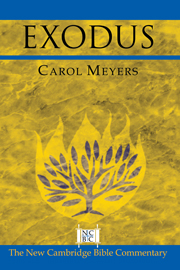Book contents
- Frontmatter
- Contents
- List of Tables
- List of Supplementary Sections
- Preface
- A Word about Citations
- List of Abbreviations
- I INTRODUCTION
- II SUGGESTED READINGS ON EXODUS
- III COMMENTARY PART I. ISRAEL IN EGYPT – EXODUS 1–15:21
- IV COMMENTARY PART II. SINAI AND COVENANT – EXODUS 15:22–24:18
- V COMMENTARY PART III. SANCTUARY AND NEW COVENANT – EXODUS 25:1–40:38
- Biblical and Extrabiblical Texts Index
- Hebrew Terms Index
- Author Index
- Subject Index
- References
II - SUGGESTED READINGS ON EXODUS
Published online by Cambridge University Press: 05 June 2012
- Frontmatter
- Contents
- List of Tables
- List of Supplementary Sections
- Preface
- A Word about Citations
- List of Abbreviations
- I INTRODUCTION
- II SUGGESTED READINGS ON EXODUS
- III COMMENTARY PART I. ISRAEL IN EGYPT – EXODUS 1–15:21
- IV COMMENTARY PART II. SINAI AND COVENANT – EXODUS 15:22–24:18
- V COMMENTARY PART III. SANCTUARY AND NEW COVENANT – EXODUS 25:1–40:38
- Biblical and Extrabiblical Texts Index
- Hebrew Terms Index
- Author Index
- Subject Index
- References
Summary
The literature on Exodus is voluminous. Perhaps more has been written on the second book of the Bible than on any other biblical book, except possibly the first one (Genesis). For centuries, scholars have been drawn to the major features of Exodus – the compelling and dramatic story of freedom from oppression, the foundational statements of community values in the Decalogue and covenant materials, and the richly textured depiction of a national shrine and its personnel. The abundance of materials appearing in journals and produced by publishing houses specializing in religion and biblical studies makes it impossible for even the most dutiful scholar to keep up with the publications on Exodus. Clearly this survey of the literature cannot be comprehensive. Rather, it is intended to provide the reader, especially those unfamiliar with the variety and complexity of biblical scholarship, with a small sample of accessible and useful resources. Most of the works in these suggested readings represent the scholarship of recent decades, although an occasional older classic may be noted. Virtually all of them are in English, including some translated to English from other languages.
Many of the books, essays, and articles mentioned here have extensive bibliographies. Those seeking further resources should consult them, along with the works cited in the notes to this volume. Another worthwhile resource is Kenton L. Sparks, The Pentateuch: An Annotated Bibliography (Grand Rapids, Mich.: Baker Academic, 2002).
- Type
- Chapter
- Information
- Exodus , pp. 21 - 31Publisher: Cambridge University PressPrint publication year: 2005
References
- 3
- Cited by



